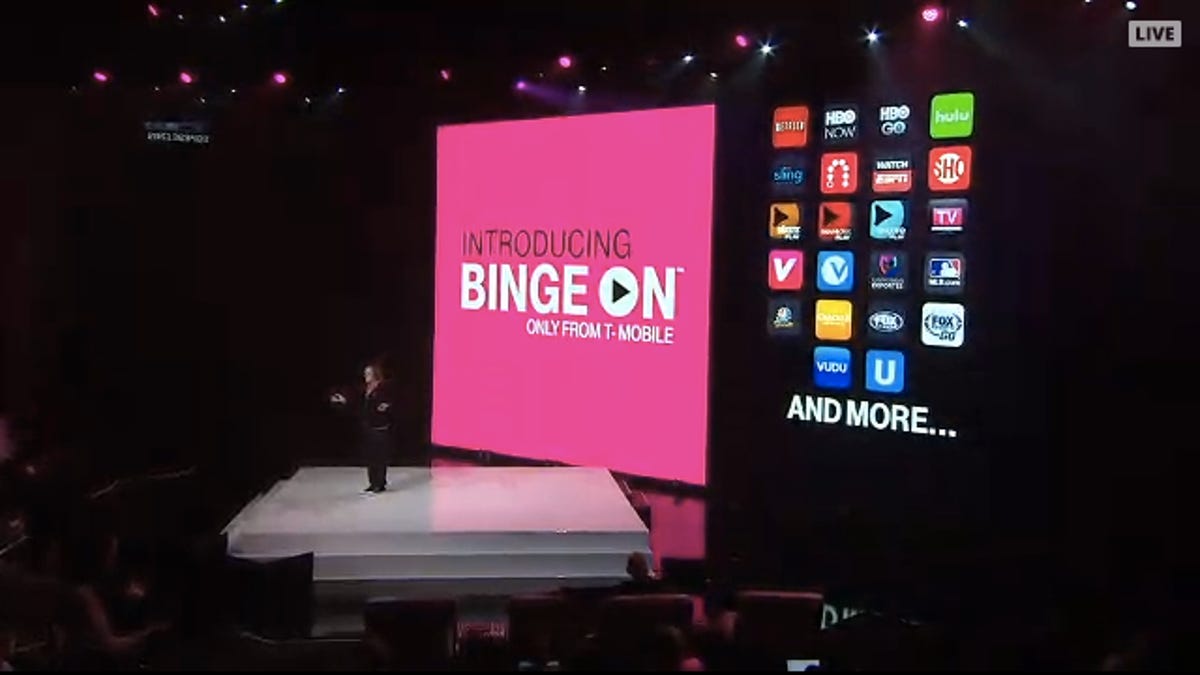Is T-Mobile's unlimited video streaming actually good for consumers?
Consumer advocates warn that while Binge On offers the short-term benefit of letting you gorge on the go, it could hurt innovation in the long run.
T-Mobile's new offer of unlimited video streaming could be a great deal for Netflix and HBO Go fanatics. It may also set a bad precedent.
The nation's third-largest wireless carrier on Tuesday took the wraps off Binge On, a program that lets some customers stream an unlimited amount of video from certain services to their smartphones without busting their monthly data caps. The program, which is similar to T-Mobile's Music Freedom service, launches Sunday with access to video from 24 popular sources, including Netflix, Hulu and ESPN.
The Bellevue, Washington, company is billing Binge On as a win for consumers. But it also raises the question of whether this sets up wireless service providers as app gatekeepers, which could in the long run inhibit the creation of new services and limit consumer choices.
"In the short term, it might be benefiting some consumers," said Matt Wood, policy director at the consumer advocacy group Free Press. "But the fact that they're willing to do this at all calls into question why there's a data cap if T-Mobile can give exemptions to whole categories of applications."
It's the control over which applications are exempt from data caps and which are not that troubles Wood and other critics, many of whom question whether the practice also violates the Federal Communication Commission's Net neutrality rules. These rules, adopted in February, are based on the principle that traffic on the Internet should be treated equally and that Internet service providers should have no say in which services and applications consumers use.
T-Mobile's new offer is an example of a practice known as "zero rating," which allows Internet service providers, such as wireless companies, not to count data usage for certain applications against a customer's monthly cap. The FCC has not taken a strong stand on this practice. Its Net neutrality rules deliberately don't prohibit such deals, allowing instead the FCC to review complaints case by case.
"There are ways that zero rating can be done badly and ways it can be done well," said Doug Brake, telecom policy analyst for the Information Technology & Innovation Foundation, a Washington, DC-based think tank that has encouraged the FCC to remain open to alternative business models. "I think the way T-Mobile has structured this is smart."
T-Mobile CEO John Legere described Binge On as "completely compliant" with Net neutrality rules. The company will allow any legal streaming service to join the program, Legere said in an interview, as long as these services meet its technical standards.
"The same people that raise that issue think that breathing the air is a violation of Net neutrality," Legere quipped.
One of his key arguments is that neither the consumer nor the services are paying to be part of Binge On. Consumers can also turn the feature off.
"How can consumer choice be bigger than yes or no?" he said.
The T-Mobile service works by using proprietary technology to downgrade the resolution of the streaming service to "DVD quality," less than one would expect on a large-screen TV. Industry watchers generally agree that customers viewing video on smartphones won't notice a difference in resolution because the screens are so small.
Critics say the fact that streaming companies need to adapt their service or seek permission from T-Mobile to be included in its program is itself a barrier to competition and ultimately will lead to fewer choices for consumers.
"One of the key principles of the Internet is that it offers innovation without permission," said Barbara van Schewick, a law professor at Stanford University. This means developers can create applications and those applications just work, but T-Mobile's program interferes with that principle because new entrants must meet the company's technical requirements, she said.
"The program has the effect of making certain video apps more attractive than others," she said.
Legere said these fears are overblown, but T-Mobile has not released details of how its technology works or what requirements need to be met.
"You know who I think can meet the technical requirements? Anyone who wants to," Legere said. "If it's proven not to be [easy], we'd adapt."
Still, Wood questioned why T-Mobile is singling out streaming video rather than including other data-intensive services like online video games. In other words, why does T-Mobile need to offer unlimited data for particular applications when it already offers a data plan that provides unlimited access to all applications? (T-Mobile increased the cost of its unlimited data plan by $15 a month on the day it announced Binge On.)
"What is the point of a cap if certain uses are exempt?" Wood said. "We don't see the rationale for a cap if you magically lift it depending on what kind of service you're using."
CNET's Roger Cheng contributed to this report.


